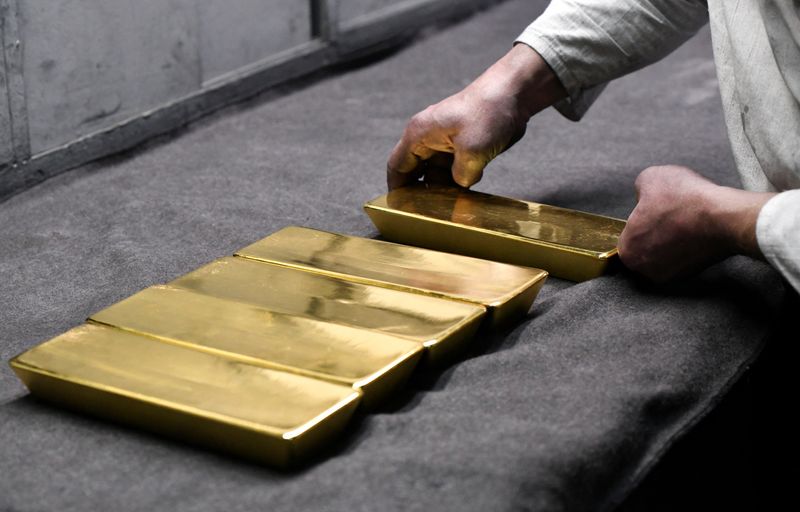
Investing.com – prices soared to record highs, with reaching a new peak of $2,449.89 per ounce on Monday. also hit its highest levels in several years earlier last week, and has seen strong gains as well.
Although all three have currently retreated from these record levels, they remain close, with analysts expecting prices to rise over the next 12 months.
If you are interested in achieving strong investment returns in gold that surpass market gains, there is one tool that can help you do that: InvestingPRO. InvestingPRO’s exclusive AI-driven data helps you identify the trajectory of gold stocks. Subscribe now with a discount of up to 40% using discount code SAPRO2 via this link!
What will drive the rise in precious and industrial metals?
While spot gold is currently trading at $2,342, ANZ Bank said in a recent note that gold prices have maintained their upward momentum amid renewed weakness in the US dollar and falling US Treasury yields. But that’s not all.
ANZ analysts wrote: “While geopolitical risks continued to boost demand for safe havens, the astonishing rise in gold demand in China in the first quarter of 2024 largely contributed to the price increase.”
China is currently the world’s largest consumer of gold, having surpassed India in 2023 to become the world’s largest buyer of gold jewelry.
Data from the World Gold Council showed that Chinese consumers were at the forefront of gold buyers, purchasing 603 tons of gold jewelry last year, up 10% from 2022. The World Gold Council expects demand for Chinese jewelry to remain high this year, or even higher compared to 2023.
Meanwhile, UBS Bank analysts raised their gold price forecast to $2,500 per ounce by the end of September and $2,600 by the end of the year. The bank’s bullish forecast is attributed to strong Chinese demand, along with a series of weak US data in April that caused a repricing of expectations for US interest rate cuts.
High interest rates tend to pressure gold because they make Treasury bonds – which are also safe-haven assets – a more attractive option for investors.
Johnny Teves, a precious metals strategist at UBS, told CNBC: “We believe gold can continue to reach new record levels.”
The poor cousin of gold
Nikos Kavalis, managing director at precious metals research consultancy Metals Focus, told CNBC: “One could argue that silver has been more interesting – and finally saw strong rises like gold.”
Silver rose to over $31 per ounce, reaching its highest level in more than a decade last Wednesday amid growing investor interest and a shortage of the precious metal. It is currently trading at $31.31 per ounce.
Teves said: “We believe silver is actually the best precious metal to truly benefit from gold price rises.” He emphasized that there is a very strong relationship between the two.
He added that when the Federal Reserve cuts rates, silver is “well-positioned to really outperform gold,” especially with the metal shortage.
Daniel Hynes, senior commodities strategist at ANZ Bank, said: “Slowing mine production growth and strong industrial demand indicate that supply is below demand, which will keep the market in a structural deficit.”
Silver is widely used for industrial purposes and is commonly incorporated into the automotive, solar panel, jewelry, and electronics industries.
Kavalis from Metals Focus said other precious metals like platinum, palladium, and rhodium are also experiencing deficits this year, and thus we may see significant price increases.
Copper shines
Copper prices have also seen strong rises recently, reaching an all-time high of $10,857 per ton last Tuesday before retreating.
ANZ Bank said copper prices were “well-supported by supply shortages” this year amid increasing supply constraints.
Last November, First Quantum Minerals (OTC:) halted production at its Cobre Panama copper mine, one of the largest copper mines in the world, following a Supreme Court ruling and nationwide protests over environmental concerns. Anglo American (JO:), a major producer, said it would cut copper production in 2024 and 2025 as part of its efforts to reduce costs.
Citigroup strategists said in a note earlier this month that they expect copper prices to rise over the next three to six months, but they believe copper still has room to rise further, depending on the degree of US interest rate cuts and global manufacturing recovery.
Citigroup strategists said: “We still firmly believe that copper is on its way to $12,000 per ton, and $15,000 per ton in our bullish forecast over the next 12 to 18 months.”

